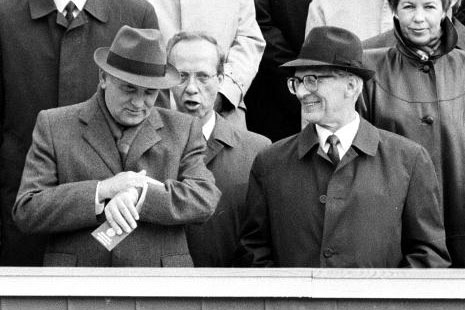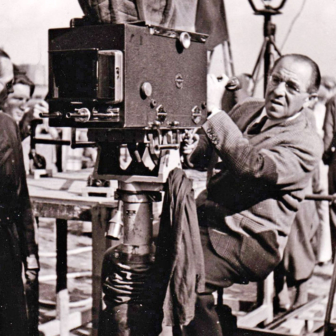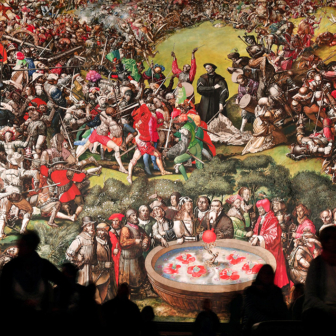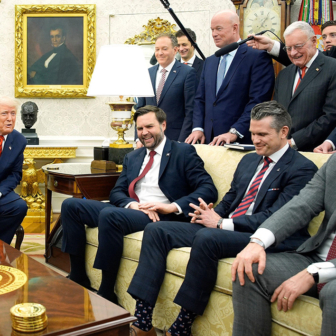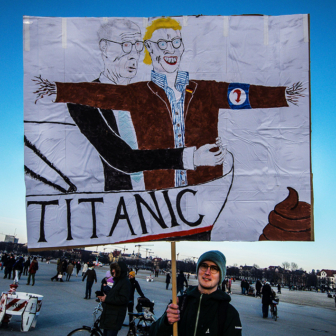FOREIGN correspondents reporting from Germany seem bewildered. Why, they ask, only two years after we congratulated Germans for having fulfilled their most ardent wish, only two years after we shared their joy and excitement, do they seem to be ungrateful, forever grumbling? How could Germans so easily become disenchanted with a process they all supported until very recently? And why didn’t the sense of shared collective happiness – if not euphoria – that we witnessed in late 1989 make them more generous towards their neighbours and guests?
The foreign observers’ bewilderment might have been caused partly by the fact that they didn’t understand that Germans have misgivings about what happened in late 1989. Many of the observers who are now at a loss to make sense of the complaining, or of the recent surge of xenophobia, took us seriously when we nodded approvingly as Walter Momper, mayor of West Berlin, declared at the opening of the border on 9 November 1989, Heute sind wir das glücklichste Volk der Welt – today we are the happiest people in the world. Foreign observers presumed that the majority of us really wanted things to happen the way they did in the months following the collapse of the East German regime. After supposedly being gagged and told what to do by the United States and the Soviet Union, Germans suddenly seemed to be in full command. And by Germans, I do not mean the managers of Mercedes Benz and Deutsche Bank, but those who had taken to the streets of Leipzig in October and November 1989, those who drank champagne on Berlin’s Kurfürstendamm in November 1989, and those who voted in German state and federal elections in 1990.
We were all perfectly happy. Or so it appeared. Everything was Friede Freude Eierkuchen, a German saying that means “everything is fine” but translates literally as “peace joy omelette.” It can have ironic undertones – the dull image of the Eierkuchen, the omelette, subverts the notions of Friede and Freude.
The government in Bonn, and with it the conformist majority of the German mass media, have faced an impossible task since 1989. They had to pretend that the demise of the German Democratic Republic had been the event most eagerly awaited in West Germany since 1949. West Germans were expected to rejoice and welcome their brothers and sisters into the folds of consumer capitalism and parliamentary democracy. East Germans, by contrast, had to be cautioned that the consequences of reunification would not be unambiguously positive for them. They needed to know that you can’t make an omelette without breaking eggs, because these days the flourishing of the capitalist economy is heavily dependent on the marginalisation of a significant segment of the population.
A short time later in Halle, some East Germans, upset because Friede and Freude had proven to be short-lived illusions, directed their eggs at the omelette chef and self-styled Einheitskanzler (chancellor of reunification). Who would have thought in 1990 that East Germans would physically attack Helmut Kohl, eighteen months after enthusiastically welcoming him as the harbinger of democracy and prosperity?
East Germans may have had many reasons for wanting to be part of a Greater Germany. They could have hoped for material wealth, for freedom of speech, for ready access to pornographic magazines, or for eight-lane freeways without speed limits. Would they have wanted to share the same country with the class enemy of forty years’ standing, with greedy, arrogant, heartless ignoramuses? If East Germans had reservations about being reunited with West Germans in 1989, however, they could not voice them too loudly, as they still harboured high expectations about becoming part of a thriving Deutschmark economy.
Most West Germans had little to gain individually from the annexation of the German Democratic Republic, or the Ostzone (Eastern Zone), as it was once again called after November 1989. The average West German would reject any proposition to move to East Germany for work, and East Germany is by and large too polluted to be attractive as a holiday destination.
Sure, there were some West Germans who repossessed properties lost decades earlier, and others who made a fast mark by exploiting East Germans through all sorts of shady schemes. Dealers and repo men were out to colonise, and had no interest in sharing West Germany’s riches with eighteen million new citizens.
As long as I can remember, resentment against East Germans has been widespread and deep-seated in West Germany. There are many reasons for that resentment. East Germans were notorious for being the least critical and the most committed Stalinists in Eastern Europe. Unlike the majority of Czechs, Slovaks, Poles or Hungarians, the majority of East Germans had enthusiastically supported their government. At least that’s how it seemed to us West Germans. We did not forgive them for cheering a repressive regime and thus seemingly replicating Germans’ enthusiastic identification with a totalitarian state between 1933 and 1945. We did not forgive them for the harassment at the border when we went by car from West Germany to West Berlin. We did not forgive them for their ridiculous, ideologically sound Newspeak, or their abominable accents. I don’t think we ever forgave them for working so little, or for having fewer heart attacks, better childcare, no unemployment, affordable housing and an excellent public transport system. We did not forgive them for not allocating tables to us in East Berlin restaurants. We did not forgive them for being more successful in almost every discipline at the Olympic Games. We most certainly did not forgive them for allowing Jürgen Sparwasser to score the only goal in the only football match ever played between a West German and an East German national side, at the 1974 World Cup finals in Hamburg.
Until 1989 we could pretend that we dearly loved them. After 1961 the wall protected us from our secretly despised (and supposedly beloved) kin. Until Mikhail Gorbachev’s visit to West Germany in early 1989, reunification was not even a remote possibility. It was safe to love them. We could demonstrate our love by publicly decrying the pitiful plight of those hidden behind the Iron Curtain.
When sending food parcels to East Germany for Christmas, we didn’t act out of a sense of solidarity with the recipients of our gifts. Rather, we might have wanted to appease our own uneasiness about having been favoured. We knew that, unlike the East German economy, our economy had not been crippled by the payment of debts created by fascist Germany, but had been pampered by American aid under the Marshall Plan.
Before reunification, East Germans travelling to West Germany, most of them pensioners visiting relatives, were entitled to receive 100 Deutschmark, which they collected from the nearest West German council office. We kept up this tradition when the border was opened: East Germans were welcomed with money and with bananas, until those handing out bananas at the border discovered that it was even more gratifying to sell them at exorbitant prices. Under the guise of hospitality, handing out bananas and Deutschmarks to East Germans made up for some of the humiliations that East German border guards and waiters had inflicted on us.
Initially, in 1989 and maybe for the first couple of months of 1990, West Germans could not really afford to rebuff East Germans publicly. Our longing to be united with our East German brothers and sisters had not only been inscribed into our Constitution, it had also become part of our image. West Germany did very well from the 1950s, considering that the Wirtschaftswunderkind, the wunderkind of the American-sponsored 1950s European economic miracle, had lost a war not so long ago. We needed to pretend that we were an unfortunate, indeed sad, nation, suffering from the partition, lest our less prosperous neighbours envied our material riches.
In other words, there was no choice in November 1989 but to celebrate and be happy. Germans could not just suddenly declare that they did not want to be reunited. And for a moment they sincerely believed they were happy. And they made everyone else believe that, thus laying the foundations for the bewilderment I detect in the articles of foreign correspondents.
After a few months’ grace, however, there appeared to be only one mechanism holding back open hostilities between East Germans and West Germans (“Ossis” and “Wessis,” “Zonis” and “Bundis”) – a shared xenophobia. By the time East Germany was formally incorporated into the Federal Republic of Germany, in October 1990, not even a massive public relations effort could entice West Germans to celebrate.
OBSERVERS from other countries also sometimes fail to appreciate that Germans didn’t think the developments after November 1989 much resembled what they might have chosen had they been given the opportunity to consider their options. The process of reunification was inevitable and beyond our control. At least that’s how it has been perceived, and, more importantly, portrayed.
Arguably, reunification did not begin with the fall of the Berlin wall but with the earlier mass exodus of East Germans to West Germany via Hungary and via the West German embassies in Warsaw and Prague. As the power of the East German communist party inevitably declined, sealed trains from Poland and Czechoslovakia began travelling to the West German border via East Germany. To prevent others from boarding them, the trains didn’t stop until they reached the West.
In the lead-up to the fall of the wall, history was already perceived as a train moving rapidly and inexorably through space and time. Making history became synonymous with increasing its speed. Erich Honecker, general secretary of East Germany’s Socialist Unity Party, and his politburo did not keep pace. “Life is punishing those who are late,” Mikhail Gorbachev said to Honecker, admonishing the old man to hurry up.
One month after the Soviet leader’s much-publicised advice to his East German counterpart, Honecker’s successor agreed to the opening of the border between the two Germanies. Bärbel Bohley, spokesperson for the East German opposition, said, “We did not want this. Opening the border now is much too early” – setting herself against the course, so it seemed, of history, setting herself against the long lines of East German cars chugging along to the banana republic they had learned so much about in the commercials screened on West German television. The revolution, as it was called by then, had gained a momentum of its own, she was told.
We did not have to be told. We were glued to our television sets, which had showed East German cars arriving from Hungary and trains with hundreds of East Germans arriving from Poland and Czechoslovakia, and which now showed cars being driven through the Iron Curtain. And which showed, after the opening of the border on 9 November, Leonard Bernstein conducting the Berlin Philharmonic Orchestra as it played Beethoven’s Symphony No. 9 and the choir sang the words from Friedrich Schiller’s “Ode to Joy,” Und wer’s nie gekonnt / der stehle weinend sich aus diesem Bund, “And whoever was never able to must creep / tearfully away from this circle.” With the train of historical progress doggedly on its way, Schiller’s message of the totalitarian and particularistic nature of bourgeois humanity was driven home with what Adorno called the affirmative violence of Beethoven’s music. It reminded us of the mercilessness of the punishment that would befall those who decide to be late.
The overwhelming majority of those in both Germanies who weren’t happy about the course of events after November 1989 didn’t imagine that they’d be able to bring the train of historical progress to a halt. Anybody attempting to stop the train was told that they ran the risk of being run over or of derailing it. West Germany’s leaders never tired of warning that any derailment would have catastrophic consequences. And again and again the train’s speed was accelerated – either by speeding up the formal process leading to the annexation of East Germany or by intensifying the bombardment of metaphors that made us hear the train rolling along.
Initially everything went smoothly. Few questioned the rationale behind the train’s movement. There were few who wondered aloud who was actually sitting in the cab, or who had invented it in such a convincing fashion that everybody took its unstoppable momentum for granted. Every day we were told that we were witnessing a powerful force that made East Germany go west. The engine that was on its undeterrable way was History itself. Dr Kohl of Oggersheim, who holds a doctorate in history, did not tire of declaring that any occasion in which he was involved was an historical event that would be recounted in the schoolbooks of our grandchildren.
The parliamentary opposition – the Social Democrats and the Greens – were mesmerised by a spectacle seemingly conjured up by a Helmut Kohl who had suddenly returned from the dead, and initially appeared immobilised. But not for long. Led by the elder statesman Willy Brandt, who once and for all made amends for having fled fascist Germany by becoming the advocate for a new Greater Germany, the Social Democrats not only jumped aboard the moving train but also claimed to have taken control of it simply by demanding that it increase its speed. The Greens took it for granted that they would not have the opportunity to sit in the driver’s cab. The train has departed, they lamented; we do not want to be left behind. Historical progress is inevitable, we were told; the acceleration of historical progress is what a revolution is all about. The opposite was the case, however: in 1989 and 1990, the true revolutionaries would have needed to pull the emergency brake.
Germans who are whingeing and whining and saying they did not really want reunification may not be as hypocritical as at first they seem. In any case, I prefer them to those who have quickly come to terms with reunification by directing their resentment towards non-Germans, and by indulging in pan-German chauvinism.
Friede Freude Eierkuchen? With German society deeply divided – East against West, the haves against the have-nots, Germans against non-Germans – and opinion polls regularly documenting the disenchantment with reunification, the impression that 1989 brought Friede and Freude has all but gone.
Outside observers now focus on the Eierkuchen, something dull and rather ugly that’s slowly rising and changing in colour from nondescript yellow to brown. German politicians and the German media keep assuring their neighbours (and disturbed expatriates who follow events from a safe antipodean distance) that there is nothing to worry about. I think there is, and I sincerely hope I am wrong. •
Postscript (October 2010)
For a long time, the rise of the far right and the fact that endemic racist violence became the defining marker of the reunified Germany confirmed my fears and proved me right. More recently, however, there has been a remarkable turnaround. Now, Germany’s far right is more marginal than in almost all other European countries, not least because neither of the established political parties is trying to gain political capital by condoning xenophobic and chauvinist sentiments. Reunification may have turned back the clock in a West Germany that prided itself on its multicultural credentials and in 1989 seemed destined to get its first left-wing chancellor in Oskar Lafontaine. Twenty years later, however, the regression of the early 1990s has been left behind and German civil society appears relatively robust. In comparison with their neighbours, Germans tend to be more socially progressive and less inward-looking (the recent fascination with the views of former central banker Thilo Sarrazin notwithstanding). Berlin, rather than London or Paris, can claim to be Europe’s cultural capital.
While I was wrong in my gloomy predictions about the return of a distinct German ugliness (if not evil), I was right about the hollowness of the pro-reunification rhetoric. For many years after 1989, the relationship between Wessis and Ossis, Bundis and Zonis, West Germans and East Germans has been determined by a sense of resentment dating back to the days when there were two Germanies. Twenty years after reunification, German society is far from being cohesive. Even though there is now a generation of young adults who have never known a politically divided Germany, the organic symbiosis predicted by Willy Brandt in his famous 1989 dictum, Jetzt wächst zusammen, was zusammengehört – what belongs together will merge – has not yet eventuated. •
